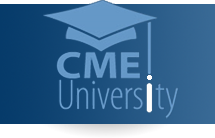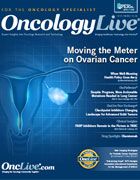"Advancing Hope": SITC Designs Innovative Educational Experience for the Management of NSCLC
Lung cancer alone accounts for 26.5% of all cancer-related mortalities in the United States, which is more than any other malignancy. Despite increased awareness that smoking is an important risk factor for lung cancer, which has reduced the number of smokers in the U.S., nearly a quarter of a million new diagnoses are expected in 2016.

CME activity for physicians and nurses is available at: cmeuniversity.com Lung cancer alone accounts for 26.5% of all cancer-related mortalities in the United States,1 which is more than any other malignancy. Despite increased awareness that smoking is an important risk factor for lung cancer, which has reduced the number of smokers in the U.S., nearly a quarter of a million new diagnoses are expected in 2016.1
Immunotherapy has emerged as an effective strategy to empower the immune system to destroy cancer cells. Agents, such as immune checkpoint inhibitors, which 'release the brakes' on the immune system, allowing cancer cells to be targeted for destruction, have provided dramatic results in some patients. This renewed sense of possibility for patients and caregivers has allowed a new sense of hope for patients diagnosed with cancer.2
Two such drugs that block the PD-1 pathway, nivolumab (Opdivo) and pembrolizumab (Keytruda), were approved by the FDA in 2015 for the treatment of advanced non—small cell lung cancer (NSCLC) that has progressed on or after platinum-based chemotherapy, and with tumors that express the molecule PD-L1 (pembrolizumab only).3-5 Patients who responded to treatment with anti-PD-1 therapy experienced durable results with tolerable side effects and lived longer than those who received docetaxel chemotherapy.3-4,6
The knowledge gained from these approvals led to an influx of novel immune-based agents in development. Although rapid progress and new clinical trials represent promising options for patients, they have also led to a need for education.
The Society for Immunotherapy of Cancer (SITC) has sought to meet the demand for educational resources as cancer immunotherapy becomes a standard treatment option. A member-driven organization dedicated to improving outcomes for patients with cancer and making immunotherapy a standard of care, SITC has launched a number of programs to address the educational needs of all stakeholders in the fight against cancer. One such endeavor is a short video aimed at comprehensively educating physicians, nurses, and patients about immunotherapy as a treatment option for NSCLC.
Created in partnership with leading lung cancer experts and patient advocacy groups, Non-Small Cell Lung Cancer Immunotherapy: Advancing HopeTM follows a patient with stage IV NSCLC as he works with his cancer care team to make an informed decision about which treatment option is right for him.
Presented in an animated whiteboard format, this video explains the basics of the immune system, how cancer immunotherapy works, current FDA-approved immunotherapeutic agents, the importance of clinical trials, and potential side effects of cancer immunotherapy.
In addition to the video, this educational initiative offers a companion online CME/CNE certified activity to provide high-level, targeted information for physicians, registered nurses, and nurse practitioners. Written by leading experts in the field and presented in case study format to ensure a translatable model, this CME/CNE component aims to help prepare physicians and nurses for broad aspects of clinical management that they might encounter with patients undergoing cancer immunotherapy treatment, such as patient selection and managing toxicities.
To accommodate the busy schedules of healthcare professionals, this online activity is housed on an educational portal from the Postgraduate Institute for Medicine and can be accessed at any time at no cost to the user.
Encourage others to watch Non-Small Cell Lung Cancer Immunotherapy: Advancing HopeTM by sharing this link: sitcancer.org/hopefornsclc/advancing-hope on social media using the hashtag #HopeforNSCLC
Supported by independent educational grants from AstraZeneca, Bristol-Myers Squibb, Genentech, Lilly, and Merck & Co, Inc.
This video was produced prior to the October 2016 FDA approvals of 1) TECENTRIQ ® (atezolizumab, Genentech, Inc.) in patients whose disease progressed despite treatment with platinum-containing chemotherapy and 2) KEYTRUDA ® (pembrolizumab; Merck & Co., Inc.) as first-line therapy in patients whose tumors express high levels of PD-L1 on an FDA-approved test, without certain genetic mutations (EGFR or ALK). As a leader in the field of cancer immunotherapy research and education, SITC will continue to update this video series as additional immunotherapy treatments become available.
References
- SEER Stat Fact Sheets: Lung and Bronchus Cancer. National Cancer Institute, National Institutes of Health, Bethesda. 2016. http://seer.cancer.gov/statfacts/html/lungb.html. Accessed 27 Sept 2016.
- Brahmer JR, Pardoll DM. Immune checkpoint inhibitors: making immunotherapy a reality for the treatment of lung cancer. Cancer Immunol Res. 2013;1(2):85-91.
- Brahmer J, Reckamp KL, Baas P, et al. Nivolumab versus docetaxel in advanced squamous-cell non-small-cell lung cancer. N Engl J Med. 2015;373(2):123-135.
- Borghaei H, Paz-Ares L, Spigel DR, et al. Nivolumab versus docetaxel in advanced nonsquamous non-small-cell lung cancer. N Engl J Med. 2015;373(17):1627-1639.
- Garon EB, Rizvi NA, Hui R, et al. Pembrolizumab for the treatment of non-small-cell lung cancer. N Engl J Med. 2015;372(21):2018-2028.
- Herbst RS, Baas P, Kim DW, et al. Pembrolizumab versus docetaxel for previously treated, PD-L1-positive, advanced non-small-cell lung cancer (KEYNOTE-010): a randomised controlled trial. Lancet. 2016;387(10027):1540-1550.




